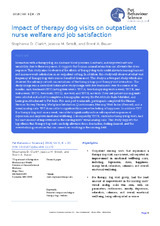Impact of therapy dog visits on outpatient nurse welfare and job satisfaction
Autor
Clark, Stephanie D.
Smidt, Jessica M.
Bauer, Brent A.
Editor
Universidad de Córdoba, Departamento de Medicina y Cirugía AnimalFecha
2018Materia
BurnoutCompassion fatigue
Therapy dogs
Welfare
METS:
Mostrar el registro METSPREMIS:
Mostrar el registro PREMISMetadatos
Mostrar el registro completo del ítemResumen
Interaction with a therapy dog can decrease blood pressure, heart rate, and improve heart rate variability; due to these responses, it suggests that human-animal interaction can alleviate the stress response. This study aims to observe if the effects of therapy dog visits could alleviate nursing burnout and increase work satisfaction in an outpatient setting. In addition, this study will observe at what visit frequency of therapy dog visits nurses benefited from most. This study is a two-part study, which also observed the salivary cortisol concentrations of the therapy dogs post therapy visit interaction. The study design was a controlled before-after study design with five treatments over the course of six months, each treatment (TRT) lasting four weeks: TRT A, two therapy dog visits a week; TRT B, one visit a week; TRT C, two visits; TRT D, one visit; and TRT E, no visits. Four out-patient nursing units were selected and asked to complete a demographic survey, the Pet Attitude Scale-Modified, and Lexington Attachment to Pet Scale. Pre- and post-treatments, participants completed the Human Services Survey, Nursing Workplace Satisfaction Questionnaire, Nursing Work Index (Revised), and a visual analog scale. TRT A was able to significantly increase the feeling of happiness. In addition TRT B, a therapy dog visit once a week, was able to significantly reduce self-reported responses of depression and improve emotional wellbeing. Consequently, TRT E, control/no therapy dog visits, had the least amount of improvement in the nursing units’ visual analog scale. This study supports the hypothesis that therapy dog visits can help alleviate stress, frustration, feeling drained, and the overwhelming sensation that can come from working in the nursing field.

